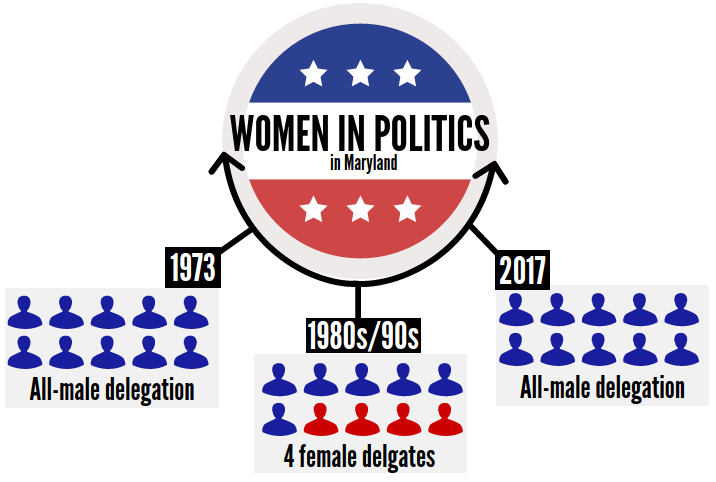Gender gap in US government persists
February 1, 2017
When 10 Marylanders took their oaths of office for the 115th Congress Jan. 3, not a single woman stood among them. It was the first time Maryland has sent an all-male delegation to Congress since 1973.
The Maryland delegation neared equal representation in the 1980s and 90s, when it had four female representatives out of 10. Today, that number is zero.
Female representation is low throughout the country, not just in Maryland. Maryland is one of 13 states with an all-male delegation in the 115th Congress. Two of these states, Mississippi and Vermont, have never had a woman in Congress. In total, only 19 percent of current congresspeople—104 of 536 members—are female.
Causes of the Gender Gap
The gender gap in politics is often described as self-perpetuating.
“Often, women just don’t see [running for office] as a possibility if they don’t see people like them in those positions or out there on the campaign trail,” said Clare Bresnahan, the executive director of She Should Run, an organization advocating for increased female participation in politics.
Inspiring women to run begins with seeing other women in politics, she said.
It’s so important to have role models for women and girls, to see themselves in elected office and know that it’s possible.
— executive director of She Should Run Clare Bresnahan“It’s so important to have role models for women and girls, to see themselves in elected office and know that it’s possible,” Bresnahan said.
For the next two years, at a minimum, Maryland women will likely not have a female role model with an all-male Congressional delegation.
“Young girls in the area have a difficult time finding a role model in politics now, with no women from Maryland in Congress and the fact that we have never had a woman president,” freshman Meera Dahiya said.
In addition, women are less likely than men to be encouraged by parents, teachers and party leaders to run for office, according to a November article in the New York Times. Other factors, including the incumbent advantage—the structural advantage that current elected officials have in reelection campaigns—and the history of men dominating the political arena may contribute to the lack of women’s representation in government, government teacher Suzanne Johnson said.
Striving for Equal Representation
Despite the deterring factors, when women do run for office, they are as likely as men to be elected, the Times reports. Still, if women’s progress continues at the same rate it has since 1960, women will not achieve 50 percent representation in Congress until at least 2117, according to predictions by experts at the Women’s Policy Research Institute.
Some women and girls express concerns about male representatives’ ability to represent their interests.
“They don’t know our opinions or our experiences,” junior Isabella Lorence said.
This is especially problematic considering that just over half of Maryland’s population identifies as female.
“Since they’re equal portions of the population, each of them should have an equal say,” junior Liam Marshall said. “They have different perspectives, men and women.”
Differing Governing Styles
Different experiences can impact how female politicians govern. Since the 1970s, women in Congress have sponsored bills regarding “women’s issues”—bills that focus on issues such as abortion, contraception, childcare and paid family leave—at much higher rates than men, according to a U.S. News article in December.
But only two percent of these proposed “women’s issues” bills are passed. That’s half the rate of other proposed bills, according to the article.
In addition, only one percent of women’s issues bills sponsored by women are passed; oftentimes, proposals are not taken seriously unless men introduce them, the U.S. News article concludes. To some, this seems nonsensical.
“Women are more in tune to issues faced by regular women, such as issues with birth control and abortion,” sophomore Kalia Dell said.
Other students expressed more concern over the content and crafting of legislation than the gender of legislators.
“Legislation on women’s issues sponsored by men is not bad on face, as long as the policymaker has ensured women are integral to the process of formulating the bill,” senior Michael Hepburn said. “This role of women—within the writing of the bill—is more important than the specific sponsorship.”
Women are more in tune to issues faced by regular women, such as issues with birth control and abortion
— sophomore Kalia DellNew research suggests other drawbacks of the gender gap in politics. During the legislative process, women interrupt less and notice non-verbal cues more than their male colleagues, resulting in a tendency to be more collective and bipartisan, building coalitions and reaching consensus much faster than male politicians, according to a second New York Time article in November.
Regardless, their input is essential in crafting policies that meet the needs of all Americans, male and female.
“[Without women,] we’re not going to be getting the best policies,” Bresnahan said. “We’re not going to be able to effectively solve challenges that we face, both globally and domestically.”
Renewed Optimism for Women
Despite electoral losses and claims of sexism in the 2016 election, many women remain optimistic about the future of female representation.
“[The elections] could inspire new folks, new women and new girls, to think about running for office,” Bresnahan said. Over 4,500 women have joined She Should Run programs in the past month alone, with other women’s organizations reporting unusual increases in interest and membership.
“This election helped women realize that they have to be the ones to run for office, to be the ones to lead if they really want to effect change,” Bresnahan said. “We can’t keep waiting for one leader to come and represent us and save us.”
The Women’s March on Washington was just one example of increased activism as millions of women turn their disappointment into action.
“I’ve noticed a lot of enthusiasm,” Dell said. “We need to get together, we need to rise up and we really need to take control of politics.”









